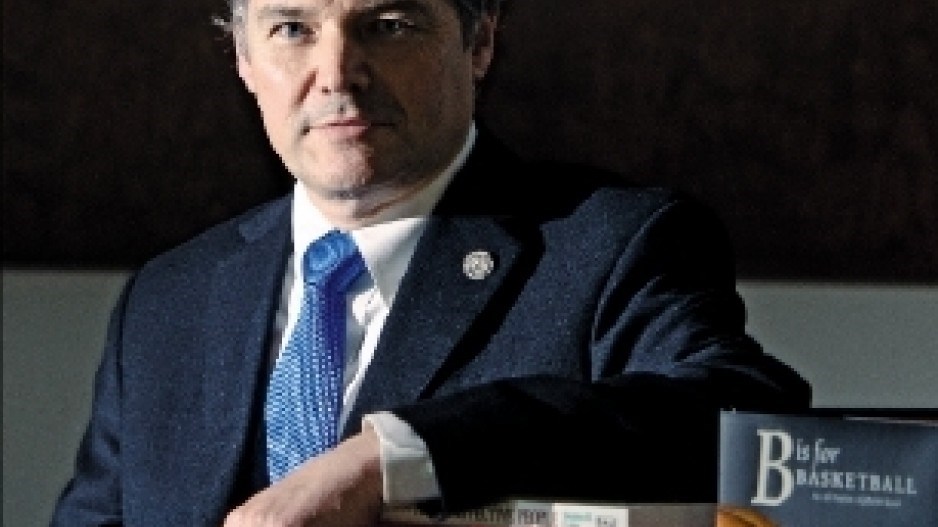Vancouver School Board (VSB) superintendent Steve Cardwell might not immediately jump to mind when people think of traditional business leaders, but with a budget of half a billion dollars and more than 8,000 employees and 55,000 students depending on him, he's at the helm of a huge enterprise.
A framed sketch of Cardwell's elementary school, Batley Grammar School in England, and a quilted wall-hanging depicting pictures from an old Dick and Jane book hanging in his office are a testament to his passion for education.
He often speaks about helping others connect with their "flow," a psychological concept that means being carried away in the moment and losing yourself in what you do to such an extent you don't realize time is passing.
The son of a science teacher and a medical doctor, Cardwell believes he was destined to work in a public service role and that teaching is an excellent way to build a connection with the community.
He started teaching in 1980 in Kitimat, a small northern B.C. community where he and his wife lived for a decade and where his daughter was born. Cardwell later worked in the Delta school system in many roles, including assistant superintendent, district vice-principal and district science co-ordinator, before joining the VSB.
Cardwell is now working on his doctorate at Simon Fraser University, specializing in student engagement.
As part of his thesis work, he spent two years surveying 5,000 students and interviewing 200 to determine what they enjoy about school and what makes them bored or disengaged.
He brings that hands-on approach to his current role.
"My best days are when I'm out in schools meeting with students and staff and really getting a sense of what's going on in our school district," Cardwell said.
When he became superintendent two years ago, the VSB faced a laundry list of significant challenges that included:
•budgetary shortfalls;
•senior staff retirements;
•aging buildings; and
•a lack of strategic direction.
One of the first things he did was develop a new strategic plan for the district. Cardwell emphasized that changes are needed throughout the organization and that he's spearheading a complete VSB redesign.
Major organizational changes are a challenge to implement at any time, and Cardwell said his approach to conflict resolution is that there are always two or more sides to every story – and it's important to listen to them.
"This allows the parties to not feel overwhelmed by the expressed differences, while at the same time opening the door to a more constructive dialogue."
For example, several years ago, staff members at an elementary school were concerned about an administrator's management style. The conflict got so bad it erupted in hallway arguments.
"I visited the school on several occasions, and through a series of conversations ... was able to mediate the situation and find common ground," he said.
With regard to the BC Teachers Federation's ongoing job action, Cardwell believes that although it's largely a provincial matter, it's critical to maintain positive relationships between school district management, administrators and employees.
"Strikes raise tensions and emotions, but they're recognized as a component of free collective bargaining," he said. "This job action is going to end at some point, and we must be able to move on."
Aside from the job action, Cardwell is dealing with a large inventory of aging buildings.
The upgrades required to maintain the school district's facilities, including seismic improvements, he said simply cost too much for any one organization to handle. That means the district must work with municipal and provincial governments as well as the private sector to find a solution to fix the city's school buildings, he said.
One solution could be allowing the VSB's buildings to serve more than one purpose.
"Our schools should no longer be single-purpose function schools," he said. "We should have other services co-located in the schools – day cares, preschools, libraries and other community services."
As to what constitutes good leadership, Cardwell said it's important to have a supportive style that values the contributions of all employees and that it's crucial to generate trust and respect.
He added that it's vital to have a clear vision that is shared by all and emphasized the importance of communicating an organization's goals and direction.
"An effective leader has high expectations and high standards, demonstrates a strong worth ethic, is ethical and maintains high values," Cardwell said.
"I think this sort of approach has been critical to my own success over the past 33 years ... and is important when motivating our staff."
Patti Bacchus, the Vancouver Board of Education's chairwoman, works alongside Cardwell and described him as an innovator.
"Steve is certainly considered one of the top educational leaders in the province," Bacchus said. "He really understands the role of public education, and not just for preparing students for the workforce, but also to be fully engaged citizens in their communities." •




